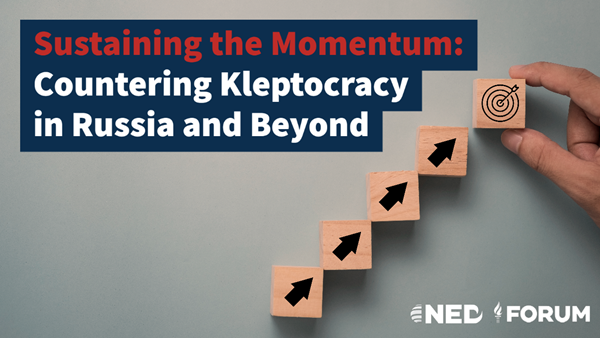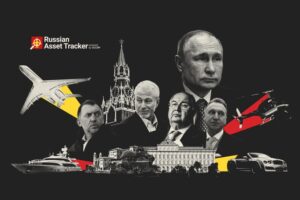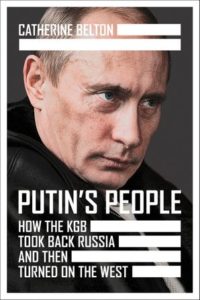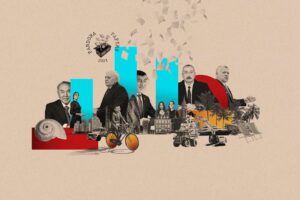 The U.S. Senate has had to make room on its schedule for consideration of the “Breaking Russia’s Energy Addicted Kleptocracy and Punishing Uncivil Tyrant Invading Neighbor Act,” reports suggest. The BREAK PUTIN Act aims to force Russian President Vladimir Putin to end the war with Ukraine by cutting off revenues through capping the price of Russian oil.
The U.S. Senate has had to make room on its schedule for consideration of the “Breaking Russia’s Energy Addicted Kleptocracy and Punishing Uncivil Tyrant Invading Neighbor Act,” reports suggest. The BREAK PUTIN Act aims to force Russian President Vladimir Putin to end the war with Ukraine by cutting off revenues through capping the price of Russian oil.
 Shortly after calling Putin’s “corrupt” and “kleptocratic” government a “regime of murderers” during a US television interview in April, Vladimir Kara-Murza, 41, was arrested in the Russian capital, writes the Independent’s Rob Hastings:
Shortly after calling Putin’s “corrupt” and “kleptocratic” government a “regime of murderers” during a US television interview in April, Vladimir Kara-Murza, 41, was arrested in the Russian capital, writes the Independent’s Rob Hastings:
He is facing a sentence of 14 years. He has already survived two assassination attempts by government agents who poisoned him. Yet even now, he refuses to be silenced and has recently been nominated for the Council of Europe’s Václav Havel Human Rights Prize.
“There are few things the Kremlin’s kleptocracy fears more than losing access to the Western financial system – so their response was not surprising,” he tells Roberts.
To address the challenge of kleptocracy for the longer haul, democratic societies need to take a number of critical steps, argues John K. Glenn, senior director at the National Endowment for Democracy’s International Forum for Democratic Studies:
-

OCCRP
First, leaders in democratic societies must prevent Russian narratives that justify violence and decry sanctions from gaining influence by elevating Ukrainian voices defending their democracy against an unprovoked invasion, he writes for Just Security. Those voices must be heard not only in the United States and Europe but in the rest of the world where, regrettably, Russian narratives are often repeated, inflected with efforts to undermine democratic unity by casting it in colonial terms.
- Second, to sustain momentum for action in the face of inflation and energy crises, political leaders must continue to speak about kleptocracy as the national security threat that it is and resist the old temptation to shrug and portray it as an unfortunate but legal byproduct of globalization. ….Russia is attracting much of the public attention these days, and rightfully so, but regimes in Venezuela, Equatorial Guinea, and Central Asia, among others, also follow the modern kleptocrats’ playbook, making this a truly global challenge.
 Third, democracies must finish the job and address weaknesses in their own societies that facilitate kleptocracy. A bipartisan majority in the U.S. House of Representatives earlier this year passed the ENABLERS Act, which requires U.S. professional service providers of legal and financial assistance to overseas clients to comply with the same due diligence and transparency requirements that apply to banks in order to combat money laundering…..
Third, democracies must finish the job and address weaknesses in their own societies that facilitate kleptocracy. A bipartisan majority in the U.S. House of Representatives earlier this year passed the ENABLERS Act, which requires U.S. professional service providers of legal and financial assistance to overseas clients to comply with the same due diligence and transparency requirements that apply to banks in order to combat money laundering…..- Fourth, the fight against kleptocracy requires sustaining nimble networks of investigative journalists and civil society activists who have the expertise to track, monitor, and identify kleptocratic activity across borders. …..They need support, and they need protection from regimes that target them physically and from libel lawsuits intended to silence them, including journalists like Catherine Belton, the author of “Putin’s People,” the subject of five defamation lawsuits by oligarchs in the U.K.
- Fifth, the community of democratic states must be prepared to adapt just as the oligarchs and authoritarian systems that stand behind them are shifting their tactics. Already, there are reportedly nearly 20 pending lawsuits in European courts identified only by the family names of the plaintiffs that likely are related to sanctions on oligarchs and their families…..RTWT
It’s just over a year ago that the International Consortium of Investigative Journalists and 150 media partners around the globe began rolling out the Pandora Papers, a world-rocking exposé that’s been called “a money bomb with political ripples,” “a financial earthquake” and “one of the essential stories of our time,” note ICIJ’s Scilla Alecci, Spencer Woodman, Brenda Medina and Michael Hudson.

Credit: OCCRP
USAID administrator Samantha Power cited the Pandora Papers — as well as the ICIJ’s earlier Panama Papers — in discussing “initiatives allowing journalists to work together across borders to piece together vast corruption scandals that span the globe.” In September, the agency issued an 84-page guide to fighting kleptocracy — which means, literally, “rule by thieves,” or a “government by people who use their power to steal their country’s resources.”
Dekleptification
Despite the dramatic and unified response sanctioning Russian oligarchs at the outset of the invasion of Ukraine, it is no longer clear whether bold words will lead to necessary actions to finish the fight against kleptocracy. The Biden Administration released a presidential memorandum identifying corruption as a core national security threat, USAID launched the Dekleptification Guide: Seizing Windows of Opportunity to Dismantle Kleptocracy, and legislation is pending on Capitol Hill focusing on the professions that enable kleptocrats to hide their illicit resources. Ahead of the next Summit for Democracy in 2023, how can democracies sustain the momentum against kleptocracy and build comprehensive strategies to address this critical global challenge?
There are few things the Kremlin’s #kleptocracy fears more than losing access to the Western financial system – so their response was not surprising, @vkaramurza told @robhastings https://t.co/h4A49ZRnty
— Democracy Digest (@demdigest) October 4, 2022
“Sustaining the Momentum: Countering Kleptocracy in Russia and Beyond“
- Shannon N. Green, Executive Director of the Anti-Corruption Task Force, USAID
- Nikita Kulachenkov, Independent Anti-Corruption Investigator
- Nate Sibley, Research Fellow, Hudson Institute’s Kleptocracy Initiative
- Paul Massaro, Senior Policy Advisor, U.S. Commission on Security & Cooperation in Europe
Thursday, October 13, 2022. 2:00pm – 3:30pm ET RSVP
One year on, Pandora Papers continues to be anti-corruption ‘tour de force’ https://t.co/xTXe7pn65H via @ICIJorg
— Democracy Digest (@demdigest) October 4, 2022







